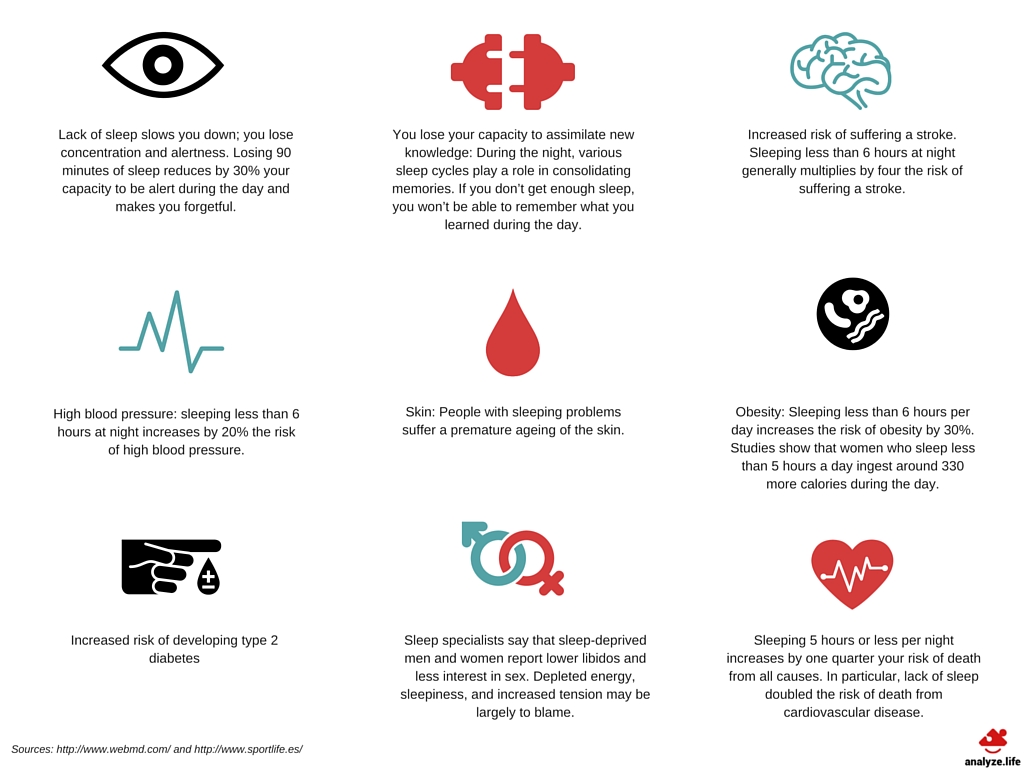It’s not big news that we need to sleep well in order to function well. While the recommended sleeping hours vary per age and lifestyle, ranging from 7 to 9 in adults, there is a small percentage of the population – those with apparently a tiny and rare mutation in the gene called DEC2 – who are fine with 5 hours per night. But how do the hours of sleep impact on our body? And why some of us need more hours than others?
Let’s start by answering the first question. The first apparent consequences of not sleeping enough are bad mood and tiredness, which directly affect our performance at work and our relationship with those near us. Not rocket science. But if we are deprived of sleep for a long period, we will find more serious consequences on our health, namely:

While the above is true for most of us, there are people who claim to need only a few hours of sleep every night. A famous case is that of Margaret Thatcher, who is said to have slept only 4 hours at night and felt absolutely fine the following day. There is a list of successful CEOs, like Marissa Mayer and Tim Cook, who also claim to need just a few hours of sleep every night, between 4 to 6. In contrast, Mariah Carey has said that she needs to sleep 15 hours to be able to sing as she likes.
The question then is: is how much sleep do people really need? Could most people do just fine on seven hours?
Do we really need 7 hours of sleep per night? Click To TweetThe answer depends on us. The National Sleep Foundation suggests we pay attention to our individual needs by assessing how we feel on different amounts of sleep. They recommend asking these questions:
- Are you productive, healthy and happy on seven hours of sleep? Or does it take you nine hours to get into high gear?
- Do you have health issues, such as being overweight?
- Are you experiencing sleep problems?
- Do you depend on caffeine to get you through the day?
- Do you feel sleepy when driving?
So there are people who need only 5 hours of sleep, and then there are us, the rest of mortals, who would love to be able to wake up earlier but can’t. Is there a way to do better?
Sleeping less but better
Mehdi Tafti, an associate professor at the Center for Integrative Genomics at the University of Lausanne in Switzerland, says that “in order to sleep less, people would need to sleep better — that is, more efficiently, with more intense REM [rapid eye movement] states” which appears to be happening in those with the DEC2 mutation we mentioned before. “We believe that short-sleepers have more efficient sleep”, he says.
Now, how can we sleep “efficiently”? Bedtime rituals could do the trick. Dr. John Cline says that in order to be able to sleep, we have to be able to relax and let go of the day’s stress and tension. We can’t make ourselves sleep; we can only allow sleep to occur. Trying to sleep only results in greater difficulty falling asleep, and when this becomes a nightly pattern, it contributes to insomnia.
We can’t make ourselves sleep; we can only allow sleep to occur. Click To Tweet4 straightforward bedtime rituals to help you sleep better
Taking for granted that you already know that drinking a more than two glasses of alcohol at night will make you sleep poorly (or at least it will make you feel awful when you wake up), and taking also for granted that you know that exercising and working out during the day will help you sleep like a baby, here are 4 other tips that will help you to sleep great:
- Turn down the thermostat
According to the National Sleep Foundation, the cooler you are, the sleepier you become. This means that the ideal temperature in your bedroom is around 65ºF (just over 18ªC).
- Leave stressful activities for the morning
Refrain from working til late or engaging in any activity or conversation that may raise your blood pressure and keep your mind working.
- Clear your mind and prepare it for sleep
A few months ago, some of us at analyze.life played a game. It was actually more like a challenge than a game, a 21-day challenge that involved taking a minute right before closing our eyes to think about positive things that happened to us during the day, or the last few days, and feel gratitude about them. Not only did it help us to see the positive things of our lives – which was the primary goal of the challenge – but also it helped to clear and prepare our minds for sleep. Absolutely recommended.
- Try engaging in mindfulness meditation
Mindfulness meditation is actually not a bedtime ritual but a practice you can try anytime during the day. You may be wondering how is mindfulness meditation connected to your sleep quality. Well, new findings suggest that even a small amount of mindfulness meditation can help calm your hyperactive mind and improve your sleep. If you’ve never done it and don’t know where to start from, there are a bunch of good apps that offer guided meditation. We like Headspace and Calm.
What about you? How well do you sleep? Keep a record of your sleeping quality with our tool. Check it out here.